Hansi Flick admitted Barcelona’s intensity dropped after a strong opening spell against PSG, noting that fatigue and the opponent’s quality shifted control away from Barça. He acknowledged the team struggled to manage the ball and tempo, particularly after the 30–35 minute mark and throughout the second half. Online, supporters split between blaming fitness levels, squad depth, and late substitutions, while others credited PSG’s organization and pressing. The conversation now turns to how quickly Barcelona can recalibrate: earlier in-game adjustments, smarter rotation, and cleaner possession under pressure will be key in their next tests.
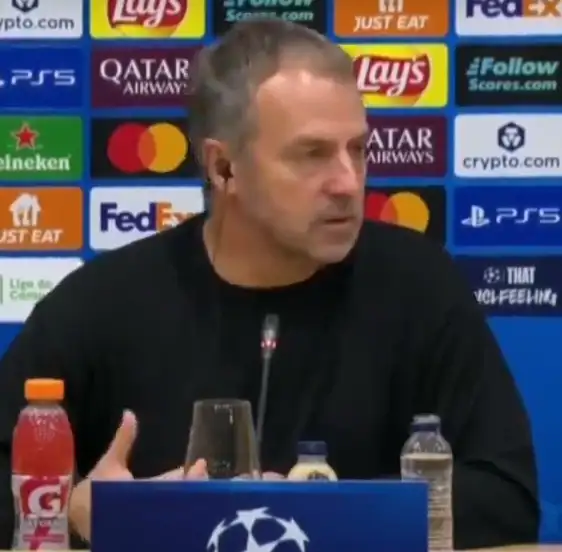
Post-match remarks from Hansi Flick following Barcelona’s game against Paris Saint-Germain, where he reflected on the shift in momentum after the first half-hour and highlighted fatigue and PSG’s performance as decisive factors.
Was the victory due to footballing reasons, or was there also a physical element involved? Flick: "Perhaps both. Especially in the second half, when you get fatigued, you can definitely see that the opponent is performing well."
@BarcaUniversal
Impact Analysis
Flick’s admission that Barcelona lost control after the 30–35 minute window and then again through the second half points to an interplay of physical load, possession management, and PSG’s tactical execution. Early phases suggested Barça’s plan—structured build-up, vertical connections, and wingers pinning PSG’s full-backs—was working. Once PSG raised their press and compressed central lanes, Barcelona’s rest-defense and short-passing chains were stressed, producing longer sequences of recovery runs and a cascade of fatigue. That physical dip amplified technical errors, making it harder to break lines and sustain territorial control.
Strategically, this is a prompt for load management and in-game elasticity. Expect more proactive substitutions between minutes 55–65, especially in double-pivot roles and advanced interiors tasked with counter-pressing resets. A calmer exit pattern—using the goalkeeper to create a temporary back-three, staggering the 6 and 8 to offer safer third-man options—can lower turnover risk in Zone 2. Defensively, tightening distances between the last line and midfield reduces exposure to PSG’s diagonal switches and half-space entries.
Medium term, the episode underscores the importance of rotation and microcycle planning amid congested fixtures. The medical and performance staff will likely recalibrate intensity peaks, while the coaching group sharpens late-game management. Credit to PSG: their timing of pressure and freshness of legs flipped the game-state. For Barcelona, acknowledging both the physical and tactical elements is a healthy step toward more robust game control.
Reaction
Fan discourse has split into familiar camps. One group rails against conditioning, framing the fade as a fitness issue and demanding tougher microcycles and earlier changes; another insists this was primarily tactical—praising PSG’s compact press and smarter rest-defense—and urges calm. The substitution debate is loudest: many argue changes arrived too late to stem PSG’s momentum, citing the visible drop in intensity in midfield and along the flanks. Several voices highlight squad depth, pointing to how the bench profiles didn’t immediately solve ball retention or pressing continuity.
There’s also a pragmatic contingent crediting PSG’s execution: they note how the French side clogged central corridors, forced rushed passes, and then exploited transitions as Barça’s spacing stretched. Some frustrated replies veer into sarcasm about halftime “boosts,” but most fans stay on the footballing point—control versus chaos. Amid the noise, supporters converge on two requests: earlier, bolder in-game tweaks and clearer role definitions for late-entering midfielders and wingers. The mood is not defeatist; it’s demanding—fans want Flick to translate the first 30 minutes into a full-match standard.
Social reactions
Hi folks, Fireside AI is launching on Product Hunt today! 🚀 Fireside assembles expert AI teams based on the world's best thinkers who collaborate in real-time to tackle your toughest questions. What makes Fireside different: - Smart discovery: Ask any question and we match
Kai Gill 👾 (@_KaiGill)
Fatigue may have played a role
BLOCKXS.COM (@blockxs)
Why did you make your change at 74min????. Anyone could see that Olmo needed to be subed early
Mzee Jatelo (@cleo_omondi)
Prediction
Short term, expect Flick to front-run fatigue by moving substitutions up a window and reinforcing ball-security patterns when protecting a lead: a situational double pivot, full-backs staggering more conservatively, and a greater emphasis on third-man runs to escape central pressure. Barcelona will likely tilt toward earlier injections of fresh legs in pressing-critical roles—particularly the 8s and wide forwards—to preserve counter-press compactness beyond minute 70.
Against opponents who mirror PSG’s intensity, Barça may adopt a more controlled Phase 1 build, occasionally inviting pressure to release runners down the weak side rather than insisting on constant central progression. Off the ball, a slightly deeper mid-block in select phases could conserve energy while still protecting the half-spaces. Over the next few fixtures, this should translate into steadier late-game metrics: fewer turnovers in Zone 2, shorter opponent possession streaks, and improved defensive field tilt.
Medium term, the staff will refine rotation cadence to keep core players fresh for top-end clashes. Provided these adjustments land, Barcelona should convert bright starts into full-match control more consistently and avoid the late fade that turned this encounter in PSG’s favor.
Latest today
- Manchester United eye Manu Koné for summer 2026 - a made-to-measure fit for Amorim's midfi...
- Ruben Amorim aligns with Jason Wilcox as Man United sharpen January transfer plan
- Ruben Amorim on 3-4-3: identity first - what it means for Manchester United and player rol...
- Amorim flags United injury crisis - Bruno, Mainoo, De Ligt, Maguire and Mount doubtful
Conclusion
Flick’s candid read—both physical and footballing—cuts through the noise. Barcelona’s issue wasn’t a single mistake but a chain: PSG escalated pressure, Barça’s security wobbled, distances grew, and the physical toll compounded. The blueprint to fix it is clear and achievable: earlier interventions, more conservative spacing when the game tilts, and bench profiles matched to pressing and retention needs.
Give credit to PSG for flipping the rhythm; give Barcelona credit for diagnosing the why. This can become an inflection point rather than a warning sign. If the staff matches the tactical plan to the team’s energy curve, the first 30-minute level can extend into the decisive final third of matches. The takeaway is not alarm—it’s refinement. Execute that, and nights like this become lessons that harden Barcelona for the season’s biggest stages.







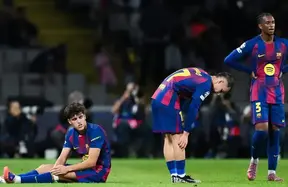
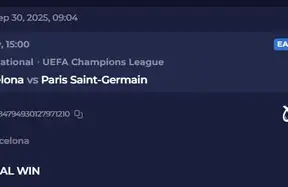
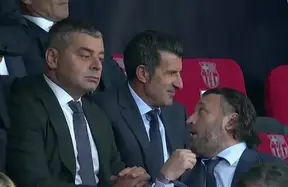

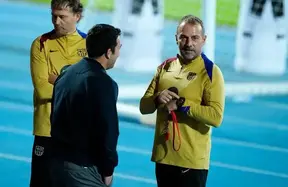
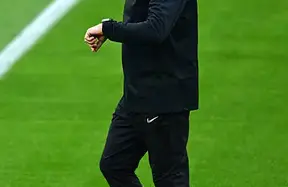
Kai Gill 👾
Hi folks, Fireside AI is launching on Product Hunt today! 🚀 Fireside assembles expert AI teams based on the world's best thinkers who collaborate in real-time to tackle your toughest questions. What makes Fireside different: - Smart discovery: Ask any question and we match
BLOCKXS.COM
Fatigue may have played a role
Mzee Jatelo
Why did you make your change at 74min????. Anyone could see that Olmo needed to be subed early
Alireza
دفعه بعد من به ترکیب استراحت میدم. 🤣
🫵🏼
He basically saying he forgot to supply drugs during halftime to his players
$$$David$$$
That's exactly my point. Squad depth. We have a long way to go.
Awesome
You will explain tire 😤
Timilehin
Too much talk
Barça Universal
Flick: "I think we started the match well, but after 30-35 minutes, PSG took control of the game more, and we struggled for the rest of the first half... In the second half, we didn’t control the ball and didn’t play at our level."
Football on TNT Sports
Nuno Mendes locked up some of the worlds best wingers last season... It took just 71 seconds for Lamine Yamal to sit him down 🥶
ESPN FC
INSANE LAMINE YAMAL DRIBBLE AGAINST HALF OFF PSG'S DEFENSE 🤯
Hypersurface
Welcome to Hypersurface. We’ve been building quietly to bring one of traditional finance’s most proven yield strategies fully on-chain. 🏄♂️ Built natively on , Hypersurface turns long-term holding into steady, transparent income with full user control. 1/10
More Crypto Online
Every major Bitcoin cycle has topped in Q4 of the post-halving year